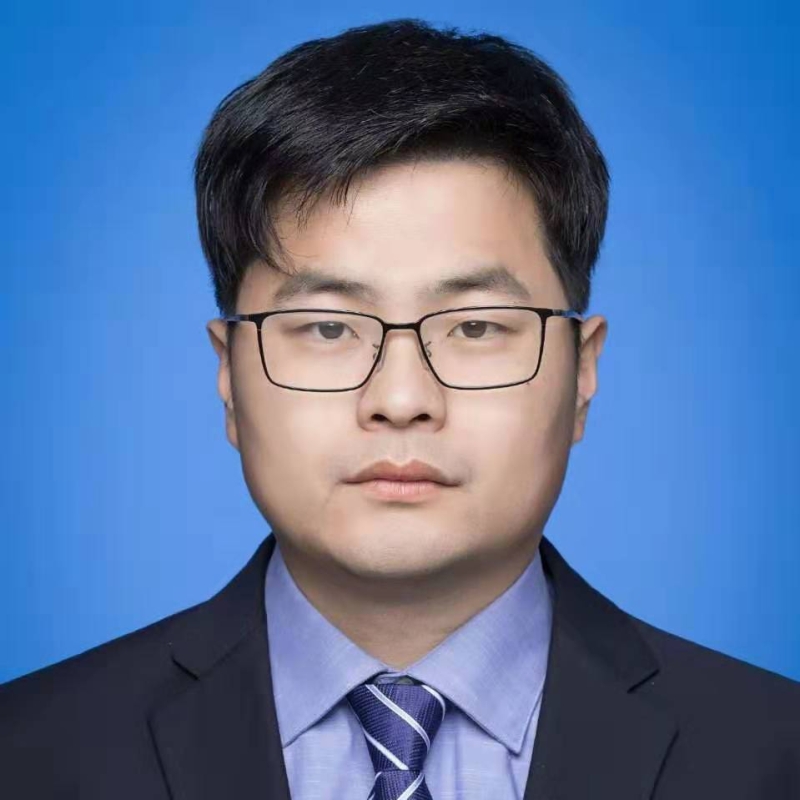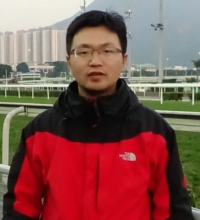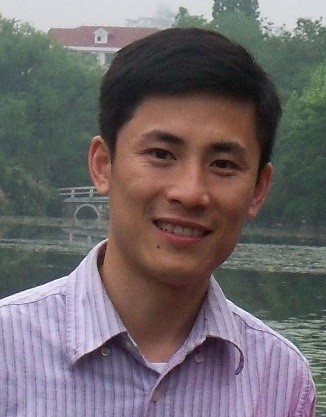
(6) Complex Networks and MAS: Guanghui Wen, Southeast University, China (Chair)
6.1. Speaker: Prof. Wangli He, East China University, China

Talk Title: Consensus of Multi-agent Systems with Efficient Communication Schemes: Stochastic Sampling or Event-triggered strategies
Abstract: This talk focuses on consensus of multi-agent systems with efficient communication schemes. Firstly, leader-following consensus with stochastic sampling is considered. A distributed consensus protocol with probabilistic sampling in two sampling periods is proposed. A general consensus criterion is derived for multi-agent systems under a directed graph. Then, a dimension-reduced condition is obtained for multi-agent systems under an undirected graph, which greatly facilitates its application to large-scale networked agents. Secondly, a dynamic event-triggered strategy is proposed to solve the consensus problem of multi-agent systems, in which an auxiliary parameter is introduced for each agent to regulate its threshold dynamically. A distributed adaptive consensus protocol is formed including the updating law of the coupling strength. It is proved that the triggering time sequences do not exhibit Zeno behavior. Examples are given to validate the effectiveness of theoretical results.
Biography: Dr. Wangli He received the B.S. degree in information and computing science and the Ph.D. degree in applied mathematics from Southeast University, Nanjing, China, in 2005 and 2010, respectively. She was a Post-Doctoral Research Fellow with the School of Information Science and Engineering, East China University of Science and Technology, Shanghai, China, and a Visiting Post-Doctoral Research Fellow with Central Queensland University, Rockhampton, Australia from 2010 to 2011. During 2013 to 2017, she held several visiting positions with University of Hong Kong, City University of Hong Kong, Potsdam Institute for Climate Research Institute and Tokyo Metropolitan University. She is currently a Professor with the School of Information Science and Engineering, East China University of Science and Technology. Her current research interests include cooperative control of multi-agent systems, networked nonlinear systems, security of cyber-physical systems. She is the Chair of Technical Committee on Networked-based Control Systems and Applications of IES. She was the Visiting Associate Professor of Tokyo Metropolitan University (2015-2017). She was the recipient of Excellent Doctoral Thesis Award of Jiangsu Province in 2001, Young Elite Scientist of CAST in 2017, Young Rising Star Award of Shanghai Science and Technology Commission in 2018 and National Outstanding Youth Science Foundation in 2019.
6.2. Speaker: Prof. Zhongkui Li, Peking University, China

Talk Title: Fully Distributed Event-triggered Cooperative Control
Abstract: We consider the distributed event-triggered consensus problem for general linear multi-agent networks. A core task in the event-triggered consensus problem is to design distributed event-based protocols, consisting of the event-based control laws and the triggering functions. Based on the local sampled state or local output information, distributed adaptive event-triggered protocols are designed, which can ensure that consensus of the agents is achieved and the Zeno behavior is excluded by showing that the interval between any two triggering events is lower bounded by a strictly positive value. Our main contribution is that the proposed adaptive event-based protocols are fully distributed and scalable, which do not rely on any global information of the network graph and are independent of the network’s scale. In these event-based protocols, continuous communications are not required for either control laws updating or triggering functions monitoring.
Biography: Prof. Zhongkui Li received the B.S. degree in space engineering from the National University of Defense Technology, China, in 2005, and his Ph.D. degree in dynamics and control from Peking University, China, in 2010. Since 2013, he has been with the Department of Mechanics and Engineering Science, College of Engineering, Peking University, China, where he is currently an Associate Professor with tenure. Dr. Li is an author of a book Cooperative Control of Multi-Agent Systems: A Consensus Region Approach (CRC press, 2014) and has published a number of journal papers. His current research interests include cooperative control of multi-agent systems, networked control systems, autonomous unmanned systems. He serves as an associate editor for IEEE Trans. Automatic Control and Nonlinear Analysis: Hybrid Systems. Dr. Li was selected into the Changjiang Scholars Program (Young Scholar), Ministry of Education of China, in 2017, and the Clarivate Analytics Highly Cited Researchers in Engineering in 2018. He was the recipient of the State Natural Science Award of China (Second Prize) in 2015, the Yang Jiachi Science and Technology Award in 2015, and the National Excellent Doctoral Thesis Award of China in 2012. His coauthored papers received the IET Control Theory & Applications Premium (Best Paper) Award in 2013, the IEEE CSS Beijing Chapter Young Author Prize in 2013, and the 2009-2011 Best Paper Award of Journal of Systems Science & Complexity in 2012.
6.3. Speaker: Prof. Zhiwei Liu, Huazhong University of Science and Techology, China

Talk Title: Trusted-Node Subsequence Reduction for Designing Resilient Consensus Algorithms
Abstract: Existing resilient consensus algorithms are mainly developed based on the mean subsequence reduced (MSR) method, which requires the assumption that there exist at most f malicious agents (i.e., f-total model) and the exact information of f. However, such assumption and information are hard to satisfy and obtain in some practical multiagent networks (MANs). A novel method, called trusted-node subsequence reduction (TSR), is proposed for designing resilient consensus algorithm without using the assumption of f-total model. The main idea of the TSR method is to filter out the received information for each agent beyond a dynamic trust region, determined by the current relative state of the neighboring trusted nodes. Based on the TSR method, we design a sampled-data resilient consensus algorithm for double-integrator MANs. A necessary and sufficient graphic condition is obtained for resilient consensus of the considered MAN, which is easy to realize, even on a large scale. Finally, simulations are conducted to illustrate the effectiveness of the proposed algorithm.
Biography: Prof. Zhiwei Liu, Associate Professor, Huazhong University of Science and Technology. In June 2004, he graduated from the School of Economics and Management of Southwest Jiaotong University. In June 2011, he graduated from the Department of Control Science and Engineering of Huazhong University of Science and Technology. July 2011 - February 2017 Postdoctoral, lecturer and associate professor of the Department of Automation, Wuhan University. February 2017-present Associate Professor, School of Artificial Intelligence and Automation, Huazhong University of Science and Technology. In recent years, he has hosted three projects of the National Natural Science Foundation of China, the Morning Light Project of Hubei Province, and the Young Scholars of Wuhan University. Zeng Jin has conducted collaborative research at the City University of Hong Kong and the Royal Melbourne Institute of Technology. The main research directions are: control and optimization of distributed network systems, and smart grid control and optimization.
6.4. Speaker: Prof. Haibo Du, Hefei University of Technology, China

Talk Title: Multi-agent consensus based on non-smooth control theory
Abstract: Non-smooth/finite-time control has attracted a lot of attention in recent years due to its advantages with faster convergence performance and better disturbance rejection ability. This report first introduces the background and significance of non-smooth control theory. Then some multi-agent consensus algorithms based on non-smooth control are given. Finally, some application cases of the proposed non-smooth consensus algorithm in UAV, robot and power electronics are shown.
Biography: Prof. Haibo Du is a professor at the School of Electrical and Automation Engineering of Hefei University of Technology. He worked on the problem of analysis and synthesis of non-smooth control theory. He has presided over 2 projects of the National Natural Science Foundation of China, 4 provincial and ministerial projects and 3 entrusted projects of enterprises. He published more than 60 SCI papers, among them 12 papers are in IEEE TAC or Automatica. The papers are cited SCI more than 1500 citations by others. 7 papers are ESI highly cited papers. His research results about non-smooth control have got the Natural Science Award (Second Class) of the Ministry of Education. One paper obtained the First Prize of Anhui Province Natural Science Excellent Academic Paper and one paper has been selected the Most Cited Automatica Articles. He applied 8 china national invention patents among them 4 patents were authorized. He visited the University of Texas at San Antonio, the Royal Melbourne Institute of Technology, and the University of Hong Kong for academic exchanges and cooperation. He is the guest editor of the International Journal of Advanced Robotic and other international SCI publications. He is IEEE Senior Member, a member of Society of Intelligent Aerospace Systems for Chinese Association for Artificial Intelligence, a member of Network Science and Engineering Professional Committee for Chinese Institute of Command and Control.
6.5. Speaker: Prof. Shanying Zhu, Shanghai Jiao Tong University, China

Talk Title: Distributed Economic Dispatch in Power Systems via Dual Splitting
Abstract: Economic dispatch is a fundamental problem in power systems, whose goal is to seek a fair load sharing between generators in such a way that minimizes their total generated costs while satisfying their individual capacity constraints. Most existing methods are centralized while few works are devoted to solving the problem in a distributed manner. The problem becomes even more challenging when there is a (nonsmooth) regularization term in the cost function. A novel distributed algorithm to solve the economic problem based on duality analysis and splitting methods will be presented in this talk. This algorithm is not required to communicate sensitive gradient information while still achieving the optimum without sacrificing the performance. It is shown that the proposed algorithm converges at a nonergodic convergence rate of O(1/k) for general convex cost functions and a linear convergence rate for smooth and strongly convex cost functions, respectively. Extensions to solve the optimal energy management problem for multiple energy systems which are interconnected with each other via energy hubs will also be discussed.
Biography: Prof. Shanying Zhu is an associate professor in the Department of Automation, Shanghai Jiaotong University. In 2013, he graduated from the Automation Department of Shanghai Jiaotong University and obtained a doctorate in engineering. From 2013 to 2015, he conducted postdoctoral research at Nanyang Technological University in Singapore and the Berkeley Singapore Education Alliance (BEARS). The main research areas are distributed estimation, optimization and application in the industry in wireless networks. More than 50 papers published in IEEE Transactions on Automatic Control, IEEE Transactions on Signal Processing, IEEE Transactions on Cybernetics, Automatica, Chinese Science and CDC, IFAC, ICASSP, GLOBECOM and other internationally renowned journals and conferences Co-published a monograph in English. Hosted/participated in several national natural science funds, national key research and development sub-projects. Received the first prize of the 2016 Ministry of Education Natural Science and the first prize of the 2017 Shanghai Technology Invention. He received NSFC Outstanding Youth Science Foundation Grant in 2019.